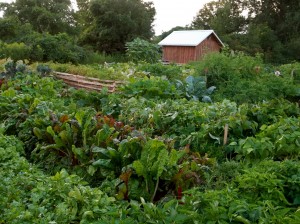Peterborough This Week Column: Growing Time Again

The brand new Liftlock Community Garden, located right along the Trent Severn Waterway, is one of many gardens located throughout the city. Photo credit: Jillian Bishop.
Community gardens and Seed Exchanges mark the beginning of planting season
From the print edition of my Farm to Table column in the Peterborough This Week newspaper. You can find the online piece here or in my MyKawartha.com Farm to Table blog.
One hot, sunny summer afternoon last year, Peterborough Community Garden Network Co-ordinator Jillian Bishop spread her daily harvest out on the ground to photograph.
She had just carried it home from her own 10×10 community plot and she proudly wanted to document the fruits (and vegetables) of her labour before bringing them into her house.
While she was snapping pictures, an elderly gentleman came walking up the street. He stopped, amazed at the piles of tomatoes, peppers, cucumbers, beets, beans, and greens and shook his head.
“Well, will you look at that!” he exclaimed. “Where’d you get all of those veggies?”
Bishop looked at her piles of produce and realized that she had amassed quite a feast — and this was only from one day of harvest.
“I grew it,” she replied.
Looking from her to the small front yard of her row house, he looked a tad confused.
And then the questions started.
Thankfully, Bishop is used to answering questions. She gets enough of them asked on a daily basis – both at community garden plots across Peterborough and at her Aylmer Street office.
“The first question is usually about what community gardens actually are,” says Bishop. “And the answer is that it depends on the garden.”
A community garden is parcel of land that is used collaboratively by a group of people. Usually this means that individuals have their own small plot, though in some cases people work together on one communal plot. Essentially, it is a place for people to grow their own produce.
You can find community gardens sprinkled throughout the city, often hidden away in vacant lots, adjacent to parkland, or on pieces of private property that have been donated to the Network. Each garden is unique in that it has its own rules and fees, but all of them are open to the public.
The next question usually involves reasons for using community gardens.
“Really, everyone has their own reason for getting a plot,” explains Bishop. “Some people don’t have land that they can use for their own gardens – particularly renters, condo owners, studentsâ?¦ Others see it as a way of saving money on groceries.”
With the price of groceries continuing to go up, the ability to save hundreds of dollars in food costs is an attractive one.
“Then there are people who want to work with and learn from fellow gardeners – and we have some very experienced gardeners working on some of our plots,” continues Bishop. “Some people join in order to be part of a community of other growers. Others do it to find a connection with the land or the seasons. Some do it because they want someplace to relax and grow flowers. In the end, it doesn’t matter why people join. They all end up gaining the same benefits.”
People interested in getting a garden plot can call Bishop at her Peterborough Green-Up office 705-745-3238 (Ext. 209) or e-mail her at pcgn@greenup.on.ca. With the popularity of garden plots, you may want to consider calling soon.
In the meantime, many gardeners are currently in the planning stages for their own community plots and personal gardens. Those who start their plants from seed will need to be starting indoors in the next few weeks.
The best place in Peterborough to get local heritage variety seeds? I’d say the annual Seedy Sunday seed exchange, happening this coming weekend at George Street United Church, from 2-5pm. There will be vendors selling a huge variety of heirloom seeds, local community gardeners offering resources, advice and information, as well as a seed exchange area where participants can trade seeds or purchase some for a donation. I’ll definitely be in attendance.
While gardeners and food enthusiasts are excited about the fresh produce to come this spring, there are still some great local seasonal flavours to be had – even now, at the tail end of winter.
This week’s recipe is one of my March favourites. It makes use of these local winter vegetables. And one that is almost 100 per cent local. It is also a very quick and inexpensive winter soup to prepare.
Potato Leek Soup
1 tbsp of butter
2 cups of leeks (a very generous 2 cups, or you can add a small onion)
2 cups of diced potatoes
1 litre of vegetable or chicken stock
1 bay leaf
salt and course black pepper to taste
Procedure:
1. Melt butter and then cook the leeks for 5-7 minutes or until soft. If you add a few pinches of salt to your leeks at the beginning, they will sweat more.
2. Pour in the stock, add the potatoes and bay leaf, and cook until the potatoes are soft, 15-30 minutes.
3. Remove bay leaf.
4. Puree in small batches in a blender – careful: hot liquids will splatter easily in blenders, so small batches are a must! And make sure the seal is tight.
5. Season to taste with salt and course pepper.
I usually garnish this soup with some cheddar cheese and crumbled bacon over top. Delicious!
